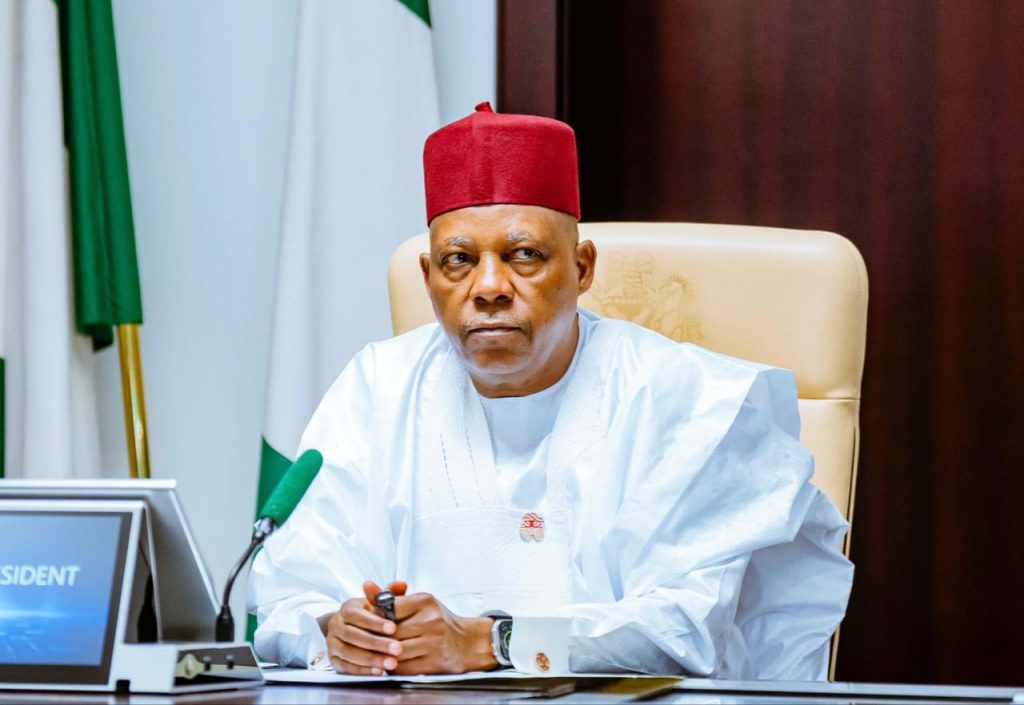Vice President Kashim Shettima on Friday departed Abuja to represent President Bola Tinubu at the G20 Leaders’ Summit in Johannesburg, as Nigeria confronts a surge in violent attacks and mass kidnappings.
Tinubu had been scheduled to attend the summit in person but chose to remain in the country to receive ongoing security briefings after recent violence in Kebbi and Kwara States.
Presidency officials say the decision reflects his intention to personally oversee the government’s response to the worsening crisis.
South Africa’s President Cyril Ramaphosa, the current G20 chair, invited Tinubu to this year’s gathering, which brings together leaders of the world’s largest economies as well as the European Union, the African Union and major financial institutions.
The summit, holding from Saturday to Sunday at the Johannesburg Expo Centre, will focus on global economic stability, food security, development finance and energy transition.
Shettima is expected to return after the engagements.
His trip comes amid renewed scrutiny of Nigeria’s security landscape, as armed groups continue to launch attacks across the country’s central and northern regions.
On Friday, unknown gunmen abducted an unspecified number of students from a Catholic school in Papiri, Niger State, the second mass school kidnapping in a week.
The incident occurred as international attention intensifies, partly fuelled by former US president Donald Trump’s claim that a “Christian genocide” is under way in Nigeria.
However, the Nigerian government has rejected the allegation as inflammatory and untrue.
“The Niger State government has received with deep sadness the disturbing news of the kidnapping of pupils from St Mary’s School in Agwara,” Abubakar Usman, the state secretary, said in a statement.
Niger, Nigeria’s largest state, has suffered multiple mass abductions over the past decade, including the 2021 kidnapping of 135 Islamic seminary pupils, six of whom died in captivity.
On Monday, gunmen stormed a girls’ boarding school in Kebbi State, abducting 25 students and killing the vice-principal.
Local reports claim security forces, despite receiving intelligence, guarded the school overnight but left shortly before the attack.
“The heavily armed security personnel spent time taking photographs with the students, only to abandon them 30 minutes before the attack,” the state governor alleged.
Tinubu has since ordered the Minister of State for Defence, Bello Matawalle, to relocate to Kebbi to lead rescue efforts.
No group has claimed responsibility for the latest kidnappings, but reports say armed gangs, often former herders, frequently target schools, travellers and remote villages in kidnapping-for-ransom operations.
The violence is part of a broader insecurity crisis involving bandit groups, extremist factions and communal militias.
Islamic State West Africa Province (ISWAP) on Monday claimed responsibility for killing a Nigerian army general in Borno State, releasing video footage of his death and sharing messages linked to a failed rescue attempt.
In Kwara State, 38 worshippers were abducted during a live-streamed church service earlier this week, with attackers demanding a ransom of 100 million naira (£52,662) per person.
The escalating violence has complicated Nigeria’s relations with Washington.
The Trump administration recently designated Nigeria a “country of particular concern” over alleged religious persecution, a move the administration says is based on misinformation.
US lawmakers including Ted Cruz have amplified claims of targeted attacks on Christians. But Nigerian officials insist that victims cut across religious lines.
Still, the rising tempo of attacks has increased pressure on Tinubu, who has cancelled planned trips to South Africa and Angola for the G20 and AU-EU summits.
Shettima’s presence at the G20, while the President remains at home, underscores the government’s attempt to project stability abroad while confronting a deepening crisis at home.

